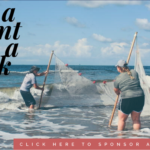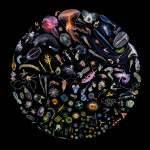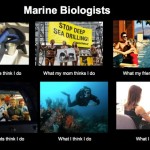 Everyone is always asking the DSN crew what are favorite books are. Well just in time for the holidays we are unleashing The Essential DSNL Library. We have kids books, entry level books, advanced books for those on the way to or already marine scientists, and the beginning of a fiction section for our down time. You can find the permanent page by clicking on the Resource link in the menu above and selecting the library. This is set up as Amazon shop and we get a small percentage of all purchased books. Buy a book and help us financially keep DSN going. Plus no better gift for the holidays than the gift of ocean knowledge.
Everyone is always asking the DSN crew what are favorite books are. Well just in time for the holidays we are unleashing The Essential DSNL Library. We have kids books, entry level books, advanced books for those on the way to or already marine scientists, and the beginning of a fiction section for our down time. You can find the permanent page by clicking on the Resource link in the menu above and selecting the library. This is set up as Amazon shop and we get a small percentage of all purchased books. Buy a book and help us financially keep DSN going. Plus no better gift for the holidays than the gift of ocean knowledge.
If you see a book missing from our beginning list please suggest it below. Provide a short commentary and we will include it in the description.






This is great! I’ve already spotted a few I want to put on my own list.
Some others you could add:
‘Pagoo’ by Holling Clancy Holling (a beautifully illustrated chapter book about a hermit crab)
‘The Sea Brings Forth’ by Jack Rudloe — last time I spoke to him he had no plans to reissue this classic. Somebody who can handle Smashwords should make him an offer!
Alister Hardy’s ‘The Open Sea’
‘The Edge of the Sea’ by Rachel Carson
Mapping the Deep (Robert Kunzig) is the best marine science book I have ever read. It could be topped by Unnatural History of the Sea (Callum Roberts), but I’m currently only a couple of chapters in.
From an entry-level standpoint, I’ve always liked this one:
http://www.amazon.com/Ocean-American-Museum-Natural-History/dp/0756636922/ref=pd_bxgy_b_img_y
Great list. I love that you have the coloring book on there. I still love that book! I see some new ones to put on my list too.
I might add:
Four Fish
Paul Greenberg
and in the spirit of the coloring book:
Seaside Naturalist
Deborah Coulombe
Mapping the Deep looks great! Thanks.
Here’s my (current) list of essential marine readings. This list is a little cetacean oriented because, hey, I study cetaceans.
The Porpoise Watcher by Kenneth S Norris
Ken Norris was one of the great whale scientists of the 21st century, and he was also an excellent writer. This book gives a history of how he got into whale research (basically, he got hired to start an aquarium and decided to catch some whales). One of the highlights is a description of the methods they used to observe dolphin behavior underwater, including specially designed boats with underwater chambers. It gives you some really excellent historical perspective on the way whale research was in the 60s and 70s, directly from one of the foremost researchers.
Lads before the wind: Adventures in porpoise training Hardcover by Karen Pryor
Karen Prior was the wife of one of the owners of Sea Life Park in Hawaii when Kenneth Norris (see above) asked her to be his dolphin trainer. This book talks a lot about the techniques used in animal training, and is another first person perspective on the early days of research with captive dolphins. This book is essential reading because it illustrates that animal communication is NOT the same thing as talking to a dolphin, and that the same techniques used to communicate with dolphins can be used to train goldfish.
The Secret Life of Lobsters: How Fishermen and Scientists Are Unraveling the Mysteries of Our Favorite Crustacean by Trevor Corson
It has been a long time since I read this, but it had lots of interesting information about lobsters and the fishery. Well written.
The Sounding of the Whale: Science and Cetaceans in the Twentieth Century Hardcover
by D. Graham Burnett
Another history of whale science. Did you know the founder of the first whale conservation society dragged dolphins onto a beach and then did mean things to them? Read this book to find out more – history isn’t all rainbows and sunshine. It’s complicated, and I think perspective helps us all be better marine biologists.
Ninety Percent of Everything: Inside Shipping, the Invisible Industry That Puts Clothes on Your Back, Gas in Your Car, and Food on Your Plate
Although this isn’t technically a marine biology book, I think that marine biologists should read it. Commercial shipping is a huge ocean industry, but is very poorly understood, and impacts many aspects of ocean conservation (acoustics, dredging, invasive species, fishing). It also will give you a better idea of who else is out there on the ocean, other than marine biologists. Another fascinating read.
I was going to put Descent, but it’s already on there, so I second it. Andrew would like to add Carl Safina’s other books: Eye of the Albatross, Voyage of the Turtle, etc.